
The Democratic Party of Japan was a centrist to centre-left, liberal or social-liberal political party in Japan from 1998 to 2016.

Naoto Kan is a Japanese former politician who served as Prime Minister of Japan and President of the Democratic Party of Japan (DPJ) from June 2010 to September 2011.
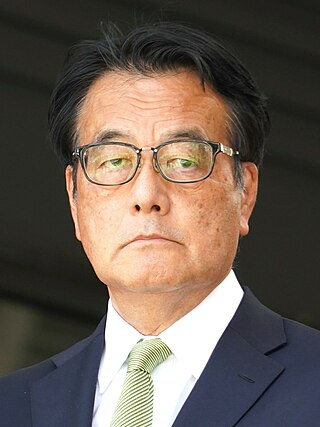
Katsuya Okada is a Japanese politician who was Deputy Prime Minister of Japan from January to December 2012. A member of the House of Representatives of Japan, he was the President of the Democratic Party, and previously of the Democratic Party of Japan. He also served as Secretary-General of the DPJ three times. During the DPJ's period in government he was Foreign Minister of Japan.

Renhō Saitō, known mononymously as Renhō, is a Japanese politician and former journalist who served as member of the House of Councillors from 2004 to 2024. She was the leader of the now-defunct major opposition party, the Democratic Party from 2016 to 2017. Renhō was a candidate for the 2024 Tokyo gubernatorial election with the support of the Constitutional Democratic Party (CDP), Japanese Communist Party (JCP), and the Social Democratic Party (SDP), but was defeated by incumbent Yuriko Koike, placing third behind Shinji Ishimaru.

Seiji Maehara is a Japanese politician who has been a member of the House of Representatives of Japan since 1993. He founded and led the political party, Free Education for All, before its merger into Nippon Ishin no Kai on 3 October 2024.

Akira Nagatsuma is a Japanese politician of the Constitutional Democratic Party of Japan (CDP), a member of House of Representatives in the Diet. Nagatsuma is currently the deputy leader and the head of the Tokyo chapter of the CDP. He had served as the Minister of Health, Labour and Welfare in the Hatoyama and Kan administration. He came to prominence when he reported missing records of public pension plans. A native of Nerima, Tokyo and graduate of Keio University, he was elected for the first time in 2000 after unsuccessful runs in 1995 and 1996.

Yoshihiko Noda is a Japanese politician. He is the current leader of the Constitutional Democratic Party of Japan (CDP), and has been a member of the House of Representatives since 2000. From 2011 to 2012, he was the Prime Minister of Japan.

Goshi Hosono is a Japanese politician and a member of the House of Representatives in the Diet. A native of Ōmihachiman, Shiga and graduate of Kyoto University, he was elected to the House of Representatives for the first time in 2000. He was the Minister of Environment and Minister of State for Nuclear Power Policy and Administration in the cabinet of Yoshihiko Noda. He represents the 5th District of Shizuoka prefecture.
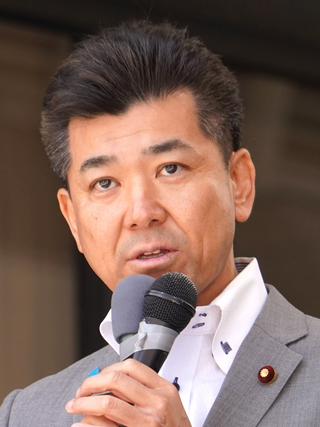
Kenta Izumi is a Japanese politician who served as leader of the Constitutional Democratic Party of Japan (CDP) from 2021 to 2024. He is also a member of the House of Representatives in the National Diet, currently for the Kyoto 3rd district. He was first elected in 2000 under the Democratic Party of Japan. He served as Parliamentary Vice-Minister of the Cabinet Office from 2009 to 2010. After that, he served as chairman of the National Diet Measures Committee and Political Affairs Research Chairman of the Kibō no Tō, the Democratic Party for the People, and the Constitutional Democratic Party of Japan.

Yukio Edano is a Japanese politician who served as the leader of the Constitutional Democratic Party of Japan from its formation in 2017 until 2021.

Junya Ogawa is a Japanese politician of the Constitutional Democratic Party, and a member of the House of Representatives in the Diet. A native of Takamatsu, Kagawa and graduate of the University of Tokyo, he joined the Ministry of Home Affairs in 1994. Leaving the ministry in 2003, he ran unsuccessfully for the House of Representatives in the same year. Two years later, he ran again and lost for a second time. He ran for a third time in 2009 and was elected for Kagawa 1st district.

The 13th Democratic Party of Japan leadership election was held on 16 May 2009 after the incumbent party leader Ichirō Ozawa announced that he would resign in early May 2009. Ozawa had been expected to lead the DPJ into a possible election victory over the long-time incumbent Liberal Democratic Party later in 2009, but a corruption scandal had forced him to resign in order to save the party's chances.

The 14th Democratic Party of Japan leadership election was held on 4 June 2010 after the incumbent party President Yukio Hatoyama resigned after failing to fulfil a promise to the voters regarding the United States Forces Japan's bases in Okinawa Prefecture; his resignation was reportedly an attempt to improve the DPJ's chances in the upcoming House of Councillors election in July 2010. Also incumbent party Secretary-General Ichirō Ozawa resigned on 4 June 2010 due to many recent scandals. Finance Minister Naoto Kan was widely expected to succeed Hatoyama, and a new government was expected to be formed on 7 June 2010. On 3 June 2010 Shinji Tarutoko declared his candidacy to run against Naoto Kan for the leadership. Apart from these two, Transport Minister Seiji Maehara and Foreign Affairs Minister Katsuya Okada were also seen as contenders, but both backed Kan. Kan defeated Tarutoko by a vote of 291–129 with 2 invalid ballots was elected president of DPJ.

Banri Kaieda is a Japanese politician who is serving as the Vice Speaker of the House of Representatives of Japan since 2021. A member of the House of Representatives of Japan, he also served as the President of the Democratic Party of Japan between 2012 and 2014. He is a former minister in the Kan cabinet.
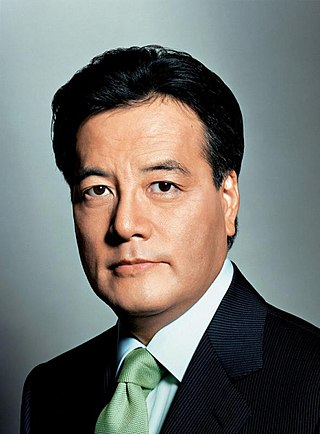
The 18th Democratic Party of Japan presidential election was held on January 18, 2015. The election was held to replace outgoing president Banri Kaieda who resigned after losing his seat in the December 2014 general election. Acting president Katsuya Okada won the election after two rounds of voting, returning to the position he held from 2004 until 2005.
The Democratic Party, was a political party in Japan. It was the largest opposition political party in Japan from 2016 until its marginalization in the House of Representatives in 2017. The party was founded on 27 March 2016 from the merger of the Democratic Party of Japan and the Japan Innovation Party. The majority of the party split on 28 September 2017, before the 2017 general election. Many of its members contesting the election as candidates for the Party of Hope, Constitutional Democratic Party of Japan or as party members without nomination. On 7 May 2018 the DP merged with the Party of Hope to form the Democratic Party For the People.
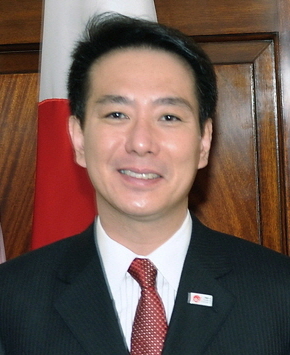
The September 2017 Democratic Party held a presidential election on 1 September 2017 to choose a replacement for the previous president Renho, who resigned on 27 July 2017.
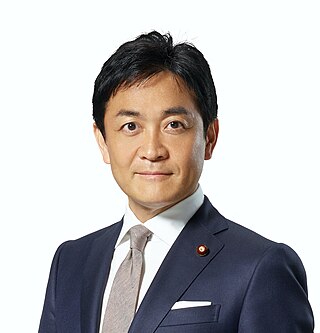
Yuichiro Tamaki is a Japanese politician and the leader of the Democratic Party For the People (DPFP). He is a member of the House of Representatives, and a former leader of Kibō no Tō. Before joining Kibō, Tamaki was a member of the Democratic Party.
The Group of Independents was a parliamentary group in the House of Representatives, the lower house of the Japanese National Diet. It consisted exclusively of non-party deputies, many of whom were formerly members of the Democratic Party.

The Next Cabinet is the de facto shadow cabinet of Japan. First used in 1999, it was created by the Democratic Party of Japan while they were the country's main opposition party to the governing coalition of the Liberal Democratic Party and Komeito. Next Cabinets have since been formed by presidents of the DPJ's 2016 successor and the Constitutional Democratic Party.




















